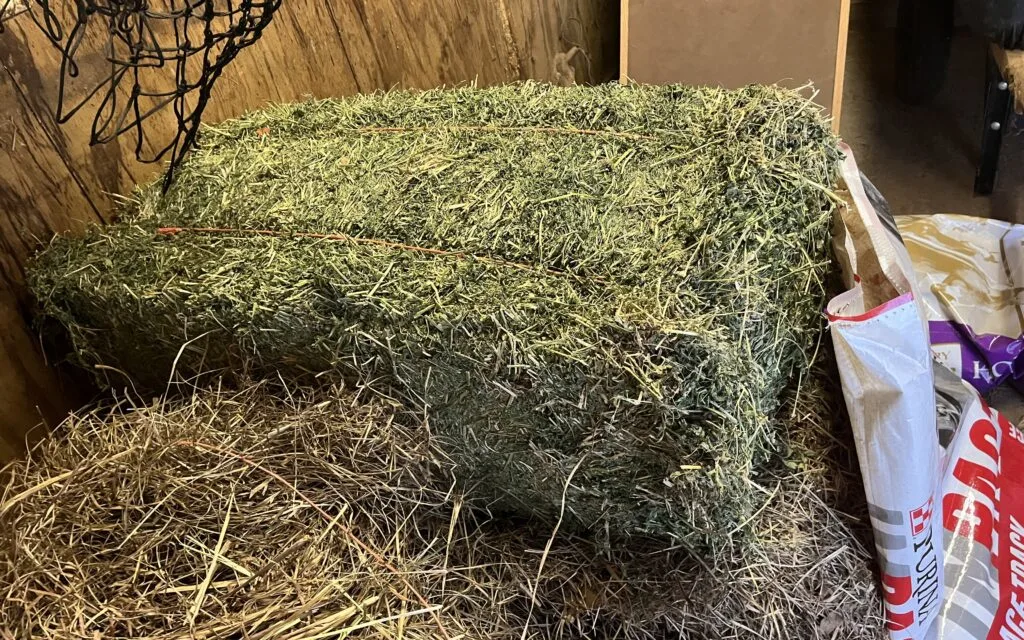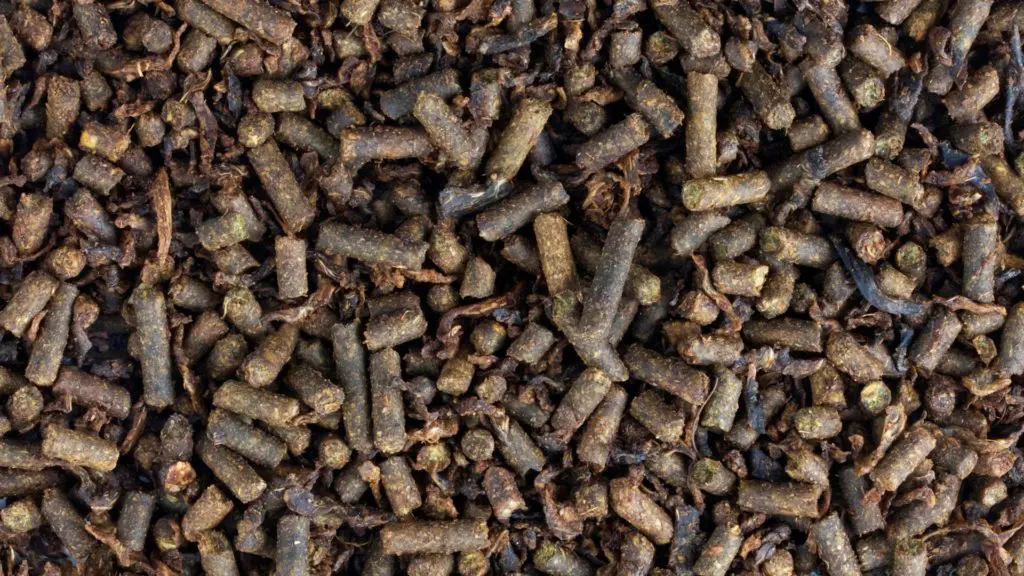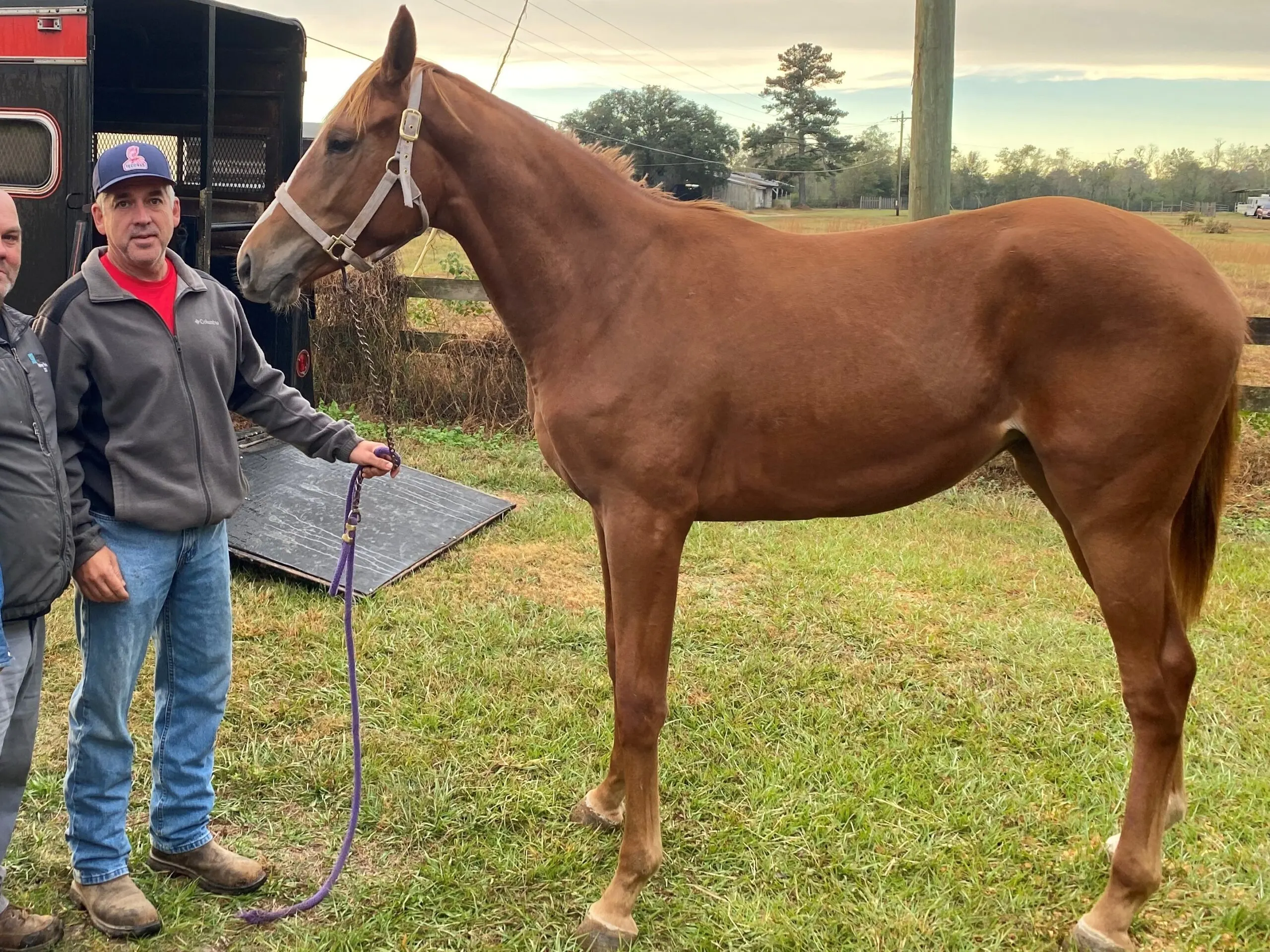Published on: May 3, 2023
As a racehorse owner, I’m mindful of providing the best possible nutrition for my animals. There are many different feeding options available, but alfalfa pellets and hay have consistently been at the top of the list. These two choices offer a variety of benefits, but it’s essential to understand the differences and how they may impact our horses.
I quickly realized the importance of knowing the pros and cons of both alfalfa pellets and hay, as they can make a significant difference in my horses’ overall health and fitness. After all, every horse has unique nutritional needs, and finding the right balance is crucial for their soundness and longevity.
In this blog post, I’ll be sharing my insights on alfalfa pellets vs. hay, discussing the advantages and disadvantages of each option. By understanding the nuances of these popular horse feeds, we can make more informed decisions and ensure our horses thrive in the best possible environment.
Alfalfa Pellets
Alfalfa pellets are a popular horse feed option made from dehydrated and compressed alfalfa, a nutrient-rich legume. The production process involves chopping fresh alfalfa, drying it to reduce moisture, grinding it into a fine consistency, and then compressing it into small, cylindrical pellets. This process helps to preserve the nutritional value while offering a convenient and easy-to-use feed solution.
Pros
- Consistent quality and nutrient content: Alfalfa pellets provide a uniform feed with a consistent nutritional profile. They offer a high level of protein, vitamins, and minerals, ensuring your horse gets the essential nutrients they need.
- Less dust and allergens: The production process of alfalfa pellets reduces dust and allergens, making it a great option for horses with respiratory sensitivities or allergies.
- Easier storage and handling: Alfalfa pellets take up less space and are easier to handle compared to hay. They are also less prone to mold, which can be a concern with hay storage.
- Reduced waste: Horses are less likely to waste alfalfa pellets, as they can’t pick through and discard parts as they can with hay. This can lead to cost savings and a cleaner feeding environment.
- Suitable for horses with dental issues: The soft and easily digestible nature of alfalfa pellets makes them an ideal choice for horses with dental problems or missing teeth, as they require less chewing.
Cons
- Cost: Alfalfa pellets can be more expensive than hay, especially if you need to purchase them in large quantities or have them shipped long distances.
- Lower fiber content compared to hay: Although alfalfa pellets are nutritious, they contain less fiber than hay. Horses require fiber for proper digestion, so it’s essential to supplement their diet with other high-fiber sources if relying heavily on pellets.
- Risk of overfeeding: Due to their concentrated nature, it’s easy to overfeed horses on pellets. Overfeeding can lead to weight gain, digestive issues, and other health problems.
- Limited chewing and natural foraging behavior: Horses have a natural instinct to graze and chew throughout the day. With pellets, they may consume their feed more quickly, leading to less chewing activity and potentially increasing the risk of boredom or behavioral issues.

Alfalfa Hay
Alfalfa hay is a type of legume hay made from the dried alfalfa plant. It is a popular choice among horse owners due to its high nutritional value, providing a good source of protein, vitamins, and minerals. It has a green color and a sweet, pleasant smell when fresh and is often fed to horses in the form of bales or cubes.
Pros
- Lower cost: Compared to alfalfa pellets, alfalfa hay is generally less expensive, making it a more budget-friendly option for horse owners. However, prices may vary depending on factors like quality and regional availability.
- Higher fiber content: Alfalfa hay contains more fiber than pellets, which is essential for maintaining a healthy digestive system in horses. The higher fiber content also helps keep them feeling full and satisfied, supporting a healthy weight.
- Encourages natural foraging behavior: Providing alfalfa hay allows horses to engage in their natural grazing behavior, offering mental stimulation and preventing boredom. This can contribute to a happier and healthier horse overall.
- Provides necessary chewing activity for dental health: Chewing hay helps horses maintain proper dental health by wearing down their teeth and reducing the risk of dental issues.
Cons
- Variability in quality and nutrient content: The quality and nutrient content of alfalfa hay can vary depending on factors such as growing conditions, harvesting methods, and storage. This can make it challenging to provide consistent nutrition to your horse.
- Dust and allergen concerns: Alfalfa hay can sometimes be dusty, which can cause respiratory issues or allergies in sensitive horses. It’s essential to choose high-quality, dust-free hay for horses prone to these issues.
- Storage and handling challenges: Storing alfalfa hay requires more space and care compared to alfalfa pellets. It needs to be kept dry and protected from mold and pests, which can be challenging for some horse owners.
- Potential for waste: Horses may waste alfalfa hay by picking through it and discarding the less desirable parts. This can lead to increased waste and higher overall feed costs.

Factors When Choosing Between Alfalfa Pellets and Hay
A. Horse’s age, weight, and activity level: Different life stages and activity levels require varying nutritional needs. Young, growing horses, pregnant or lactating mares, and high-performance horses may benefit from the higher protein and nutrient content of alfalfa pellets. On the other hand, mature, less active horses may do well with grass hay, which has lower energy content and still provides the necessary fiber to encourage natural foraging behavior.
B. Dental health: Horses with dental issues or missing teeth may struggle to chew hay properly, leading to inadequate nutrition and potential health problems. In such cases, alfalfa pellets may be a more suitable option, as they are softer and easier to digest.
C. Allergy concerns: If your horse has respiratory sensitivities or allergies, it is essential to consider the dust and allergen content of their feed. Alfalfa pellets generally produce less dust and allergens than hay, making them a better choice for horses with these issues.
D. Budget and storage constraints: While alfalfa pellets can be more expensive than hay, they require less storage space and are easier to handle. If you have limited storage options or want to reduce waste, alfalfa pellets may be the better choice. However, if you’re working with a tight budget, alfalfa hay might be the more cost-effective option.
E. Availability and quality of hay in your area: The availability and quality of alfalfa hay can vary depending on your location and the time of year. If you have access to high-quality alfalfa hay at a reasonable price, it might be a suitable option for your horse. Conversely, if hay is scarce or of poor quality, alfalfa pellets could be a more reliable and consistent choice for providing your horse with essential nutrients.

Balancing Alfalfa Pellets and Hay in Your Horse’s Diet
Every horse is unique, and their nutritional needs will depend on factors such as age, weight, activity level, and overall health. To find the right balance between alfalfa pellets and hay, start by assessing your horse’s needs and consider which option best addresses their dietary requirements. You may find that a combination of both alfalfa pellets and hay works best to provide the necessary nutrients and maintain good health.
If you’re unsure about the right balance of pellets and hay for your horse, it’s a good idea to consult a veterinarian or equine nutritionist. These professionals can provide personalized advice based on your horse’s specific needs and help you develop a suitable feeding plan.
Regularly observe your horse’s weight, body condition, and overall health to ensure they are getting the right balance of nutrients from their diet. Watch for any changes in their coat condition, energy levels, and digestion. By keeping a close eye on your horse, you can identify any potential issues early on and make adjustments to their feeding plan as needed.
As your horse’s needs change over time, you may need to adjust the balance between alfalfa pellets and hay in their diet. Factors such as seasonal changes, changes in workloads, and the horse’s life stage can all impact their nutritional requirements.
Be prepared to modify the ratio of pellets and hay based on these factors and any recommendations from your veterinarian or equine nutritionist. Always monitor your horse’s response to these adjustments to ensure their continued well-being.

Feeding Methods for Alfalfa Pellets
For older horses with dental issues or difficulty chewing, soaking alfalfa pellets before feeding can be an effective solution. Soaking the pellets in water for a few minutes softens them, making them easier for your horse to consume and digest. This method helps ensure older horses receive the necessary nutrients without straining their teeth and gums.
Younger horses with healthy teeth can typically handle pellets without any issues. You can feed these horses directly from the container, offering a convenient and straightforward feeding method. Simply scoop the appropriate amount of pellets according to your horse’s nutritional needs and provide it to them alongside fresh water.
Incorporating different feeding methods based on your horse’s age and dental health can make alfalfa pellets an even more versatile and valuable addition to their diet. By catering to their specific needs, you can ensure your horse receives the most benefits from this nutritious feed option.
Conclusion: Alfalfa Pellets vs. Hay
Both alfalfa pellets and hay offer unique benefits and drawbacks as feeding options for horses. As a horse owner, understanding the differences between these two choices is crucial in making an informed decision that best meets your horse’s individual nutritional needs.
By considering factors such as your horse’s age, weight, activity level, dental health, and any allergy concerns, as well as your budget and storage constraints, you can find the right balance between pellets and hay.
Remember to consult with a veterinarian or equine nutritionist if you need guidance, and always monitor your horse’s weight and health to make any necessary adjustments. With the right approach, you can ensure your horse thrives on a well-balanced diet, leading to a happier, healthier, and more vibrant equine companion.
Meet Miles Henry
An avid equestrian and seasoned racehorse owner, Miles Henry brings his extensive experience to the equine world, proudly associating with the AQHA, The Jockey Club, and various other equine organizations. Beyond the racetrack, Miles is an accomplished author, having published various books about horses, and is a recognized authority in the field, with his work cited in multiple publications.
🔗 Connect with Miles:
Twitter
Facebook
YouTube: Check out race highlights, horse care tips, and more!

